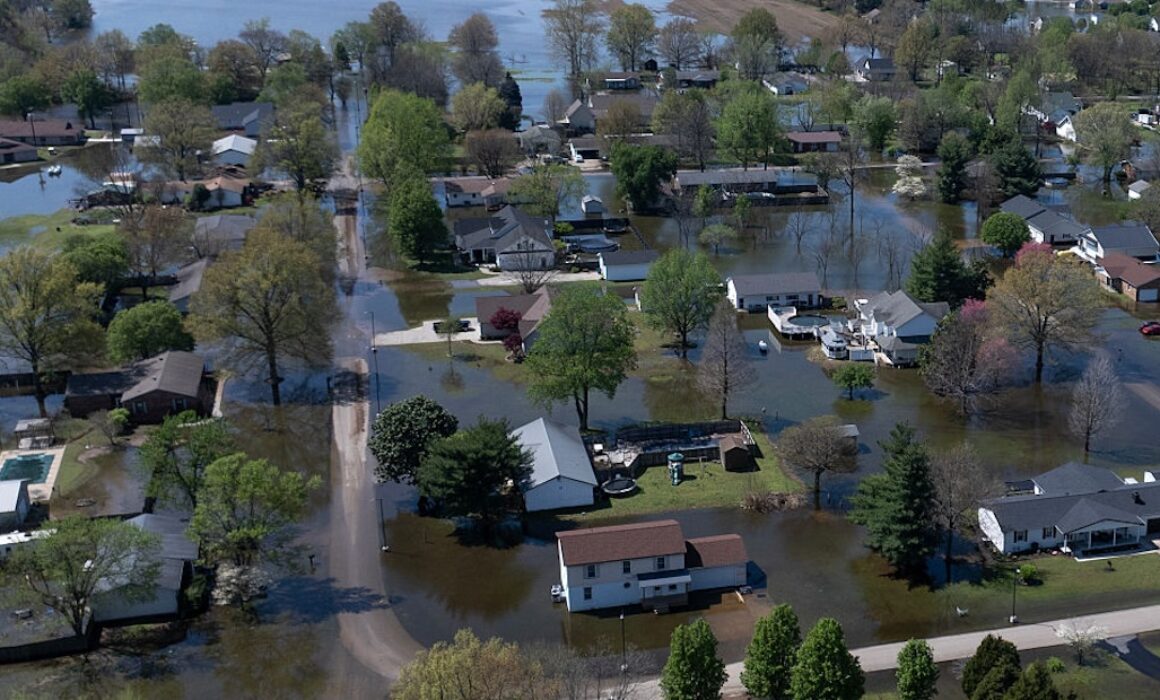It’s the Fed’s Job to Care About Climate Risk
May 9, 2025
What central bankers need to know about the threat.
The Roosevelt Rundown features our top stories of the week.

Storms in early April 2025 submerged East Prairie, Missouri, in floodwater. (Photo by Scott Olson/Getty Images)
An Economy-Wide Risk Too Big to Ignore
For too long, financial institutions have downplayed the threat of climate change–related risks. The impacts of environmental crises on macroeconomic stability, however, are unavoidable, Roosevelt Fellow Graham Steele told the Financial Times last week, and must be addressed by central bankers—a key focus of Roosevelt’s Fed Lit Substack newsletter, which highlights critical research on climate and financial risks.
Climate change has made natural disasters such as storms, floods, and wildfires more frequent, more intense, and more likely to damage property. As a result, insurance premiums for houses in disaster-prone regions are soaring—driving down home values and leaving thousands financially vulnerable. Fast Company wrote this week about the threat of a housing market crisis “that could make the [2008] subprime mortgage collapse look like a warm-up act.”
As part of the Federal Reserve’s mandate—as other countries’ central banks have interpreted—the institution has a role to play in regulating the macroeconomy in the face of climate change. Its recent retreat from taking climate threats seriously, such as withdrawing from global climate finance networks, “is a political thing,” Steele told the FT. “And that’s how you end up with a crisis. Because the risk is out there. It’s not going away—you’re just not talking about it.”
In an effort to get central bankers, economic reporters, and financial scholars talking about it, Roosevelt’s Deputy Director of Climate Policy Kristina Karlsson and Senior Fellow Sarah Bloom Raskin provide monthly analysis on the impact of climate risk on financial systems—and what the Fed should do about it. Catch up on the first three installments of Fed Lit to learn about:
What We’re Reading
- On Trump’s tariffs: This week, Roosevelt’s Todd N. Tucker chatted with The Majority Report about the president’s chaotic trade policies in the context of US trade history and in contrast to the Biden administration’s industrial strategy.
- Targeted tariffs are one tool to bolster specific domestic industries, but “there’s just no sense on the day-to-day shifting rationale of why they’re doing tariffs or what they’re going to be,” Tucker said, noting that this uncertainty means businesses are hesitating to invest and build.
- Tucker also featured in a More Perfect Union segment about what a pro-labor trade policy—one that’s neither Trump’s destructive tariff regime nor the unfettered free trade we had previously—could be.
- Raising a child is expensive enough already, and Trump’s sweeping tariffs mean the industry for baby items—car seats, strollers, bassinets, and more—is bracing for shortages and price increases, the Washington Post reported.
- On cryptocurrency: Roosevelt Fellow Graham Steele warned against the integration of crypto and traditional finance in Just Security, cowriting that lax regulation threatens to expose “the public, regulated financial institutions, and the entire financial system to significant risks.”
- On Medicaid cuts: Republicans are considering a variety of budget reconciliation proposals that would slash vulnerable peoples’ access to health care, The American Prospect reports, including forcing some Medicaid recipients to pay for coverage, implementing work requirements, and shrinking eligibility guidelines.
